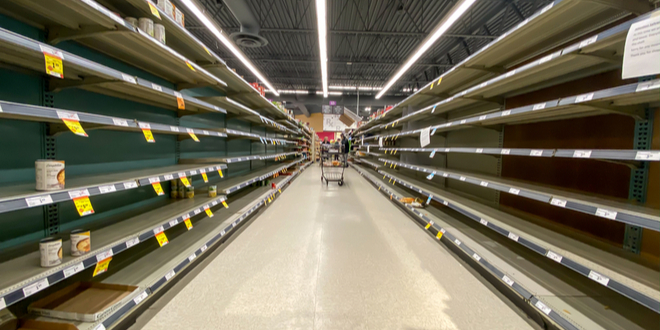In an interview on Tuesday with Politico, David Beasley, the UN World Food Programme’s executive director, warned that the conflict in Ukraine could spark off a refugee crisis worse than any ever seen before and a global food crisis in a combination. He described it as “hell.”
“Hell on Earth”
“If you think we’ve got hell on earth now, you just get ready,” Beasley warned. “If we neglect northern Africa, northern Africa’s coming to Europe. If we neglect the Middle East, [the] the Middle East is coming to Europe.”
Beasley explained that Russia and Ukraine are among the world’s biggest producers and exporters of grain. This is especially true for Africa, which imports half of its grain from Ukraine and Russia.
Beasley called the current situation the “perfect storm” of COVID inflation, climate shocks, and unresolved wars.
Ukraine was the second-largest supplier of grains for the European Union and one of the largest suppliers for emerging markets in Asia and Africa. Breaking down the numbers, Ukraine produced 49.6% of global sunflower oil, 10% of global wheat, 12.6% of global barley, and 15.3% of global maize.
But the dire warnings are not restricted to the far shores of the Atlantic. Food prices along with other basic necessities like gasoline are rising. Over the last 12 months, the cost of wheat has already risen 69 percent. Due to extreme drought, winter wheat is in very bad shape in states such as Kansas, Oklahoma, and Texas. The AG Web Farm Journal reported:
According to the National Drought Mitigation Center, more than half of Kansas was classified as under severe drought or worse as of March 8, the driest conditions since 2018. Severe drought also covers three-quarters of Oklahoma and more than two-thirds of Texas, both of which are large wheat producers.
U.S. wheat futures soared to the highest levels in 14 years early last week as the Russia-Ukraine conflict pushed two of the world’s largest wheat exporters out of the market. That has importing countries scrambling for replacement sources. Meanwhile, the winter wheat crop in China, the world’s largest grain producer, is expected to be among the worst ever after heavy rainfall delayed planting.
In January, global experts noted that China was hoarding the major types of grains and that by next year, the majority of the world’s food supply will be sitting in Chinese warehouses. According to the U.S. Department of Agriculture, China will hold 69% of the world’s corn reserves, 60% of its rice, and 51% of its wheat by mid-2022.
The shortcode is missing a valid Donation Form ID attribute.
Famine and the Messiah
This unprecedented global famine is described as a precursor to the Messianic era.
The Talmud (Sanhedrin 97a) describes a precise schedule of increasing famine based on the seven-year Shemitta (Sabbatical) cycle that presages the Messiah. The Talmud cites the Prophet Amos’ prediction of bizarre rain:
I, therefore, withheld the rain from you Three months before harvest time: I would make it rain on one town And not on another; One field would be rained upon While another on which it did not rain Would wither. Amos 4:7
It should be noted that the previous verse explicitly states that the end of days will see extreme famine as a means to urge people to repent before the Messiah:
I, on My part, have given you cleanness of teeth in all your towns, And lack of food in all your settlements. Yet you did not turn back to Me —declares Hashem. Amos 4:6
The Talmud goes on to describe the following years in the Sabbatical cycle of famine:
During the second year of that period, arrows of famine will be shot, indicating that there will be famine only in certain places. There will be a great famine during the third year, and men, women, children, the pious, and men of action will die, and the Torah is forgotten by those who study it. During the fourth year, there will be plenty but not great plenty. During the fifth year, there will be great plenty, and they will eat, and drink, and rejoice, and the Torah will return to those who study it. During the sixth year, heavenly voices will be heard. During the Sabbatical Year, wars, e.g., the war of Gog and Magog, will be waged involving the Jewish people. During the year after the conclusion of the Sabbatical Year, the son of David will come.
Rabbi Yitzchak Batzri, a noted kabbalist from Jerusalem, affirmed that the end-of-days would usher in a period of unprecedented famine.
“There will be a famine for food in the days before Moshiach (Messiah), a famine like the world has never seen before,” Rabbi Batzri said to Israel365 News.
“But it’s not all bad news,” he continued. “The prophet is saying that this famine, as awful as it will be, comes to serve a divine purpose.”
The rabbi explained that lack of food and water would inevitably drive the other nations to connect with Israel, just as Pharoah enlisted Joseph to save Egypt.
“Just as Joseph’s ascension preceded the Exodus, Israel’s leading role in helping the nations cope with famine will be a necessary stage in the Messianic process,” Rabbi Batzri said.
“They will come for food, but from the famine, they will learn that the physical is not as important as the spiritual,” Rabbi Batzri explained. “When they come to us, the nations will discover that what they lack is the special light of Torah that can only come from Israel.”
The shortcode is missing a valid Donation Form ID attribute.




